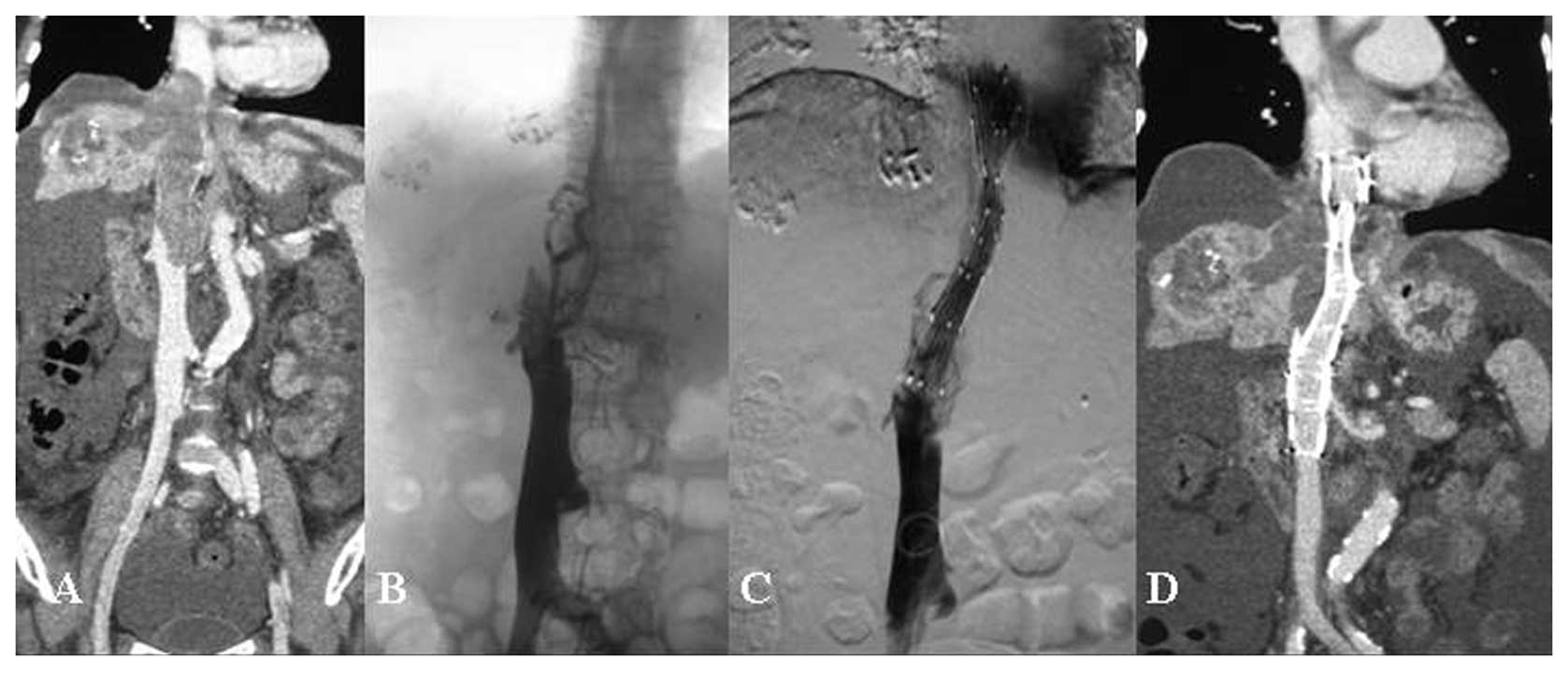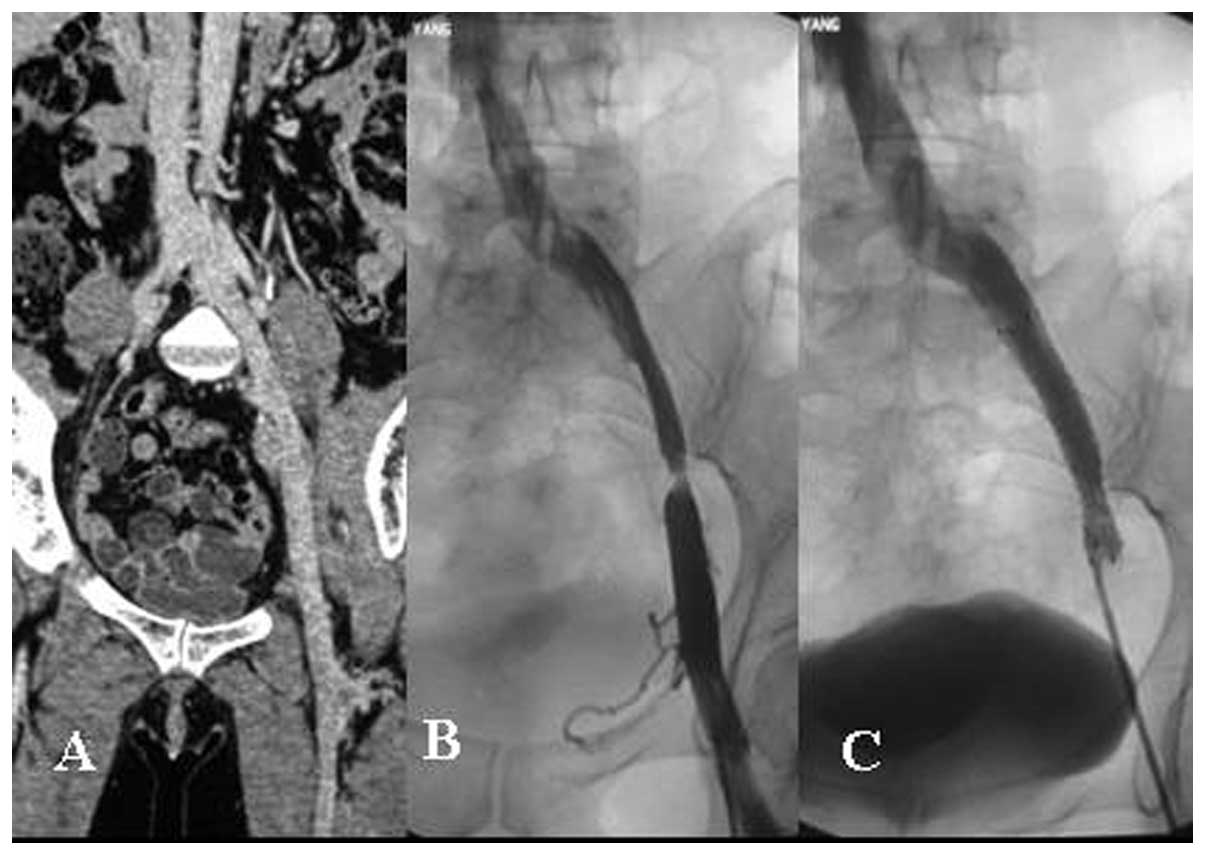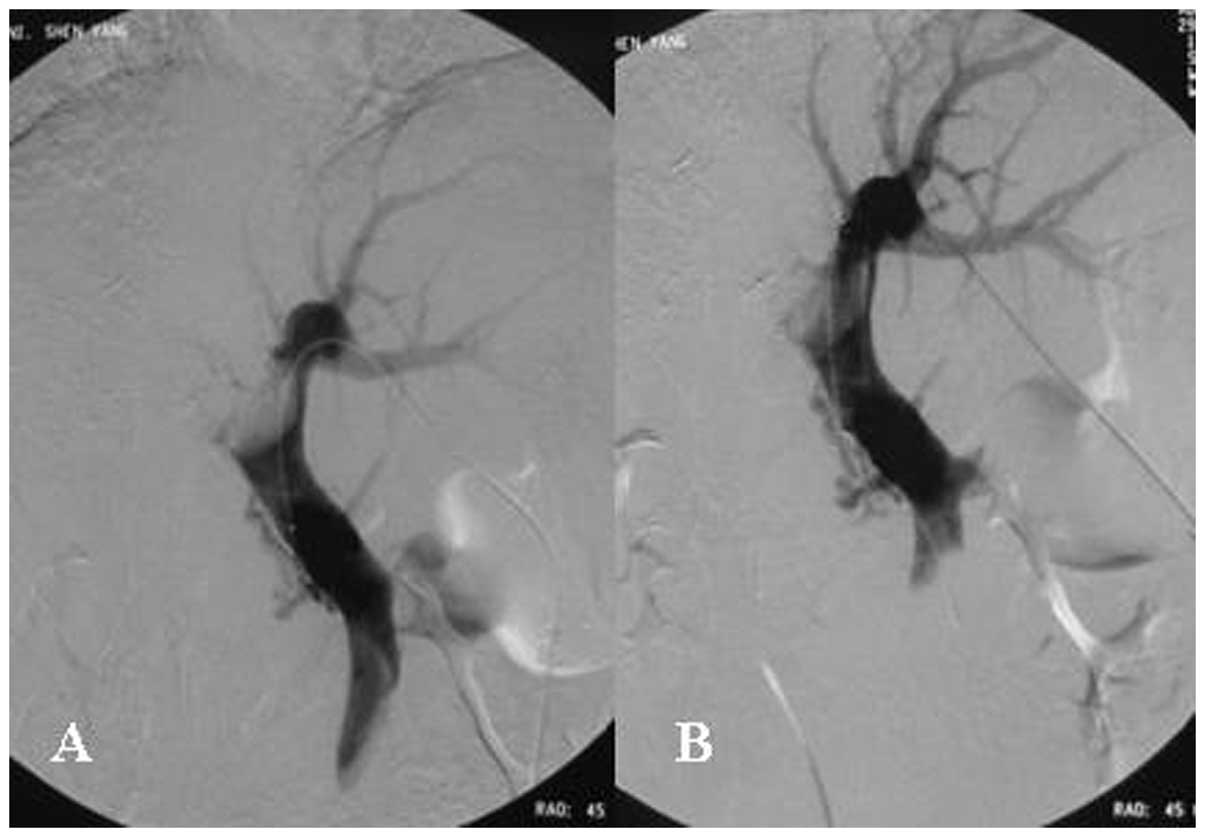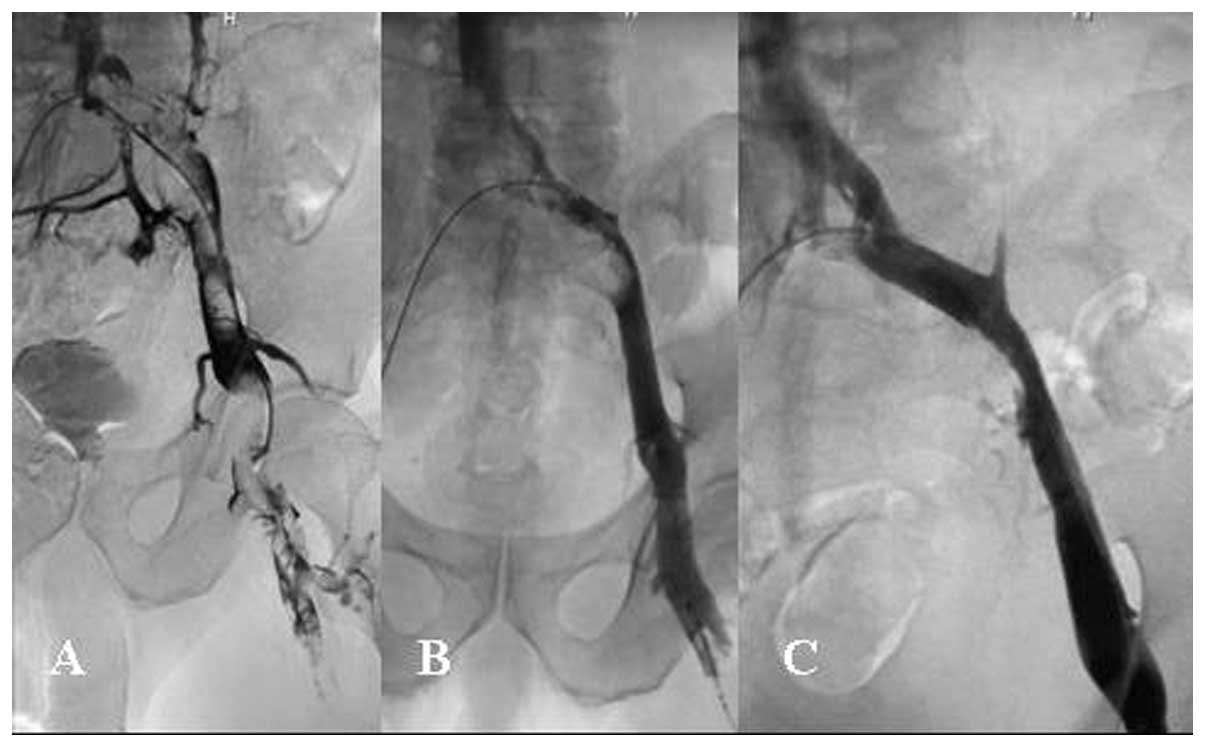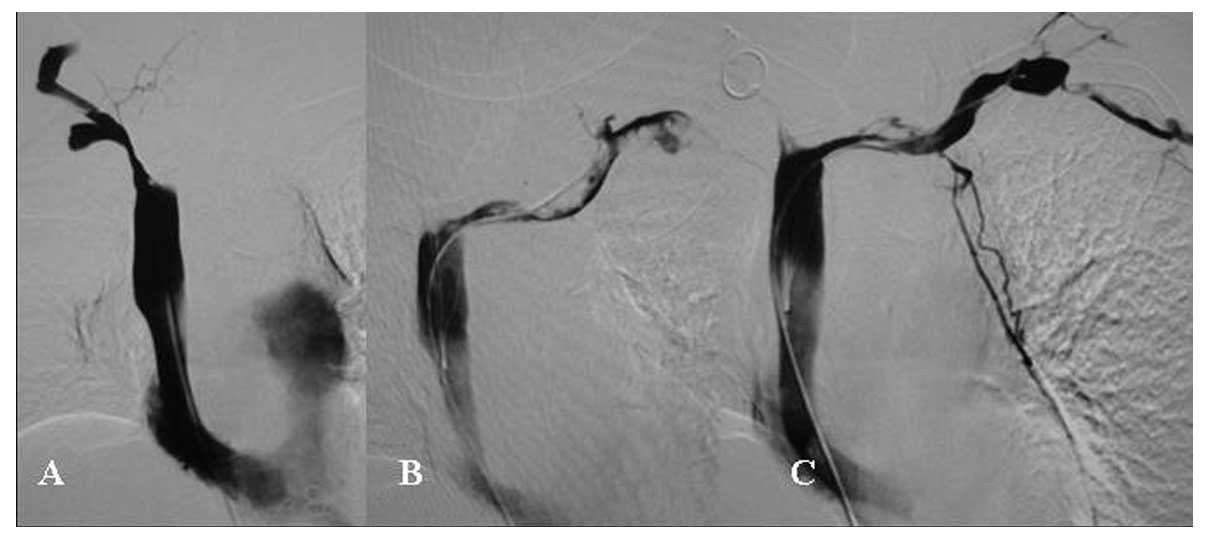|
1.
|
Mewissen MW, Seabrook GR, Meissner MH,
Cynamon J, Labropoulos N and Haughton SH: Catheter-directed
thrombolysis for lower extremity deep venous thrombolysis: report
of a national multicenter registry. Radiology. 211:39–49. 1999.
View Article : Google Scholar : PubMed/NCBI
|
|
2.
|
Kee ST, Kinoshita L, Razavi MK, Nyman UR,
Semba CP and Dake MD: Superior vena cava syndrome: treatment with
catheter-directed thrombolysis and endovascular stent placement.
Radiology. 206:187–193. 1998. View Article : Google Scholar : PubMed/NCBI
|
|
3.
|
AbuRahma A and Robinson PA: Effort
subclavian vein thrombosis: evolution of management. J Endovasc
Ther. 7:302–308. 2000. View Article : Google Scholar : PubMed/NCBI
|
|
4.
|
Kreienberg PB, Chang BB, Darling RC III,
et al: Long-term results in patients with thrombolysis, thoracic
inlet decompression, and subclavian vein stenting for
Paget-Schroetter syndrome. J Vasc Surg. 33:S100–S105. 2001.
View Article : Google Scholar : PubMed/NCBI
|
|
5.
|
Kearon C, Kahn SR, Agnelli G, Goldhaber S,
Raskob GE and Comerota AJ; American College of Chest Physicians:
Antithrombotic therapy for venous thromboembolic disease: American
College of Chest Physicians - evidence-based clinical practice
guidelines, 8th edition. Chest. 133:S454–S545. 2008. View Article : Google Scholar
|
|
6.
|
Furui S, Sawada S, Kuramoto K, et al:
Gianturco stent placement in malignant caval obstruction: analysis
of factors for predicting the outcome. Radiology. 195:147–152.
1995. View Article : Google Scholar : PubMed/NCBI
|
|
7.
|
Fletcher WS, Lakin PC, Prommier RF and
Wilmarth T: Results of treatment of inferior vena cava syndrome
with expandable metallic stents. Arch Surg. 133:935–938. 1998.
View Article : Google Scholar : PubMed/NCBI
|
|
8.
|
Lanciego C, Chacon JL, Julian A, et al:
Stenting as first option for endovascular treatment of malignant
superior vena cava syndrome. AJR Am J Roentgnenol. 177:585–593.
2001. View Article : Google Scholar : PubMed/NCBI
|
|
9.
|
Lanciego C, Pangua C, Chacón JI, et al:
Endovascular stenting as the first step in the overall management
of malignant superior vena cava syndrome. AJR Am J Roentgnenol.
193:549–558. 2009. View Article : Google Scholar : PubMed/NCBI
|
|
10.
|
Nagata T, Makutani S, Uchida H, et al:
Follow-up results of 71 patients undergoing metallic stent
placement for the treatment of a malignant obstruction of the
superior vena cava. Cardiovasc Intervent Radiol. 30:959–967. 2007.
View Article : Google Scholar : PubMed/NCBI
|
|
11.
|
Kim HS, Preece SR, Black JH, Pham LD and
Streiff MB: Safety of catheter-directed thrombolysis for deep
venous thrombosis in cancer patients. J Vasc Surg. 47:388–394.
2008. View Article : Google Scholar : PubMed/NCBI
|
|
12.
|
Maleux G, Marchal P, Palmers M, et al:
Catheter-directed thrombolytic therapy for thoracic deep vein
thrombosis is safe and effective in selected patients with and
without cancer. Eur Radiol. 20:2293–2300. 2010. View Article : Google Scholar : PubMed/NCBI
|
|
13.
|
Heymans S, Verhaeghe R, Stockx L and
Collen D: Feasibility study of catheter-directed thrombolysis with
recombinant staphylokinase in deep venous thrombosis. Thromb
Haemost. 79:517–519. 1998.PubMed/NCBI
|
|
14.
|
Hutten BA, Prins MH, Gent M, Ginsberg J,
Tijssen JG and Büller HR: Incidence of recurrent thromboembolic and
bleeding complications among patients with venous thromboembolism
in relation to both malignancy and achieved international
normalized ratio: a retrospective analysis. J Clin Oncol.
18:3078–3083. 2000.
|
|
15.
|
Prandoni P, Lensing AW, Piccioli A, et al:
Recurrent venous thrombo-embolism and bleeding complications during
anticoagulant treatment in patients with cancer and venous
thrombosis. Blood. 100:3484–3488. 2002. View Article : Google Scholar
|
|
16.
|
Nicholson AA, Ettles DF, Arnold A,
Greenstone M and Dyet JF: Treatment of malignant superior vena cava
obstruction: metal stents or radiation therapy. J Vasc Interv
Radiol. 8:781–788. 1997. View Article : Google Scholar : PubMed/NCBI
|
|
17.
|
Miller JH, McBride K, Little F and Price
A: Malignant superior vena cava obstruction: stent placement via
the subclavian route. Cardiovasc Intervent Radiol. 23:155–158.
2000. View Article : Google Scholar : PubMed/NCBI
|
|
18.
|
de Gregorio Ariza MA, Gamboa P, Gimeno MJ,
et al: Percutaneous treatment of superior vena cava syndrome using
metallic stents. Eur Radiol. 13:853–862. 2003.PubMed/NCBI
|
|
19.
|
Stambo GW, Leto J, Van Epps K, Woeste T
and George C: Endovascular treatment of intrahepatic inferior vena
cava obstruction from malignant hepatocellular tumor thrombus
utilizing Luminexx self-expanding nitinol stents. South Med J.
99:1148–1149. 2006. View Article : Google Scholar
|
|
20.
|
Zamora CA, Sugimoto K, Mori T, et al: Use
of the wallstent for symptomatic relief of malignant inferior vena
cava obstructions. Radiat Med. 23:380–385. 2005.PubMed/NCBI
|
|
21.
|
Kishi K, Sonomura T, Fujimoto H, et al:
Physiologic effect of stent therapy for inferior vena cava
obstruction due to malignant liver tumor. Cardiovasc Intervent
Radiol. 29:75–83. 2006. View Article : Google Scholar : PubMed/NCBI
|
|
22.
|
Nio Y, Iguchi C, Itakura M, et al:
Placement of an expandable metallic stent improves the efficacy of
chemoradiotherapy for pancreatic cancer with malignant portal vein
stenosis or obstruction. Anticancer Res. 29:3329–3335.
2009.PubMed/NCBI
|
|
23.
|
Novellas S, Denys A, Bize P, et al:
Palliative portal vein stent placement in malignant and symptomatic
extrinsic portal vein stenosis or occlusion. Cardiovasc Intervent
Radiol. 32:462–470. 2009. View Article : Google Scholar : PubMed/NCBI
|
|
24.
|
Kishi K, Sonomura T, Mitsuzane K, et al:
Self-expandable metallic stent therapy for superior vena cava
syndrome: Clinical observations. Radiology. 189:531–535. 1993.
View Article : Google Scholar : PubMed/NCBI
|
|
25.
|
Smayra T, Otal P, Chabbert V, et al:
Long-term results of endovascular stent placement in the superior
cava venous system. Cardiovasc Intervent Radiol. 24:388–394. 2001.
View Article : Google Scholar : PubMed/NCBI
|
|
26.
|
Smith SL, Manhire AR and Clark DM: Delayed
spontaneous superior vena cava perforation associated with a SVC
Wallstent. Cardiovasc Intervent Radiol. 24:286–287. 2001.
View Article : Google Scholar : PubMed/NCBI
|
|
27.
|
Dinkel HP, Mettke B, Schmid F, Baumgartner
I, Triller J and Do DD: Endovascular treatment of malignant
superior vena cava syndrome: Is bilateral Wallstent placement
superior to unilateral placement? J Endovasc Ther. 10:788–797.
2003. View Article : Google Scholar : PubMed/NCBI
|















